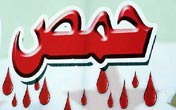 Western and Arab nations will demand on Friday that Syria allow aid to be delivered to desperate civilians in the absence of any international resolve to intervene to end a crackdown on a near year-old revolt against President Bashar al-Assad.
Western and Arab nations will demand on Friday that Syria allow aid to be delivered to desperate civilians in the absence of any international resolve to intervene to end a crackdown on a near year-old revolt against President Bashar al-Assad.
Foreign ministers from more than 50 countries were in Tunis for the first meeting of the “Friends of Syria” group, against the backdrop of a surge in government attacks on the city of Homs and mounting world outrage over violence that has claimed thousands of lives during the uprising.
In Homs, Syrian government artillery fire killed five people in the city’s Baba Amro district, opposition activists said, as the bombardment of opposition-held neighborhoods entered its third week on Friday.
“Baba Amro is being hit with 122mm artillery directed at it from surrounding villages. A father and his 14-year-old son were among those killed. They were trying to flee the shelling when shrapnel hit them in the street,” Mohammad al-Homsi told Reuters.
U.S. Secretary of State Hillary Clinton has warned that day Syria’s opposition would ultimately arm itself and go on the offensive if diplomacy failed.
But with moves for tough action in the U.N. Security Council stymied by Russian and Chinese vetoes and a lack of appetite for military action to end Assad’s crackdown, delegates in Tunis have limited options.
German Foreign Minister Guido Westerwelle told Reuters: “It is very important that the first contact group is taking place today because it sends a message to the Syrian people that we support them in their struggle for freedom.”
An updated draft declaration from the meeting called on Syria to “immediately cease all violence” to allow the United Nations access to Homs, and to let agencies deliver aid to civilians affected by the violence.
The “Friends of Syria” pledged, in the latest version of the draft seen by Reuters, to deliver humanitarian supplies within 48 hours if Syria’s government “stopped its assault on civilian areas and permitted access.”
U.N. humanitarian envoy Valerie Amos was expected to attend the meeting in Tunis, along with representatives from the International Committee for the Red Cross, which is trying to arrange daily ceasefires between the Syrian authorities and opposition to allow in humanitarian aid.
The Red Cross said Syria had not replied to its request for a truce to allow in aid and evacuate wounded.
In a sign the international community is seeking ways around the Security Council deadlock, U.N. Secretary General Ban Ki-Moon said he would dispatch former U.N. chief Kofi Annan to Syria as a joint U.N.-Arab League envoy.
HARSH REALITIES
The draft communique did not mention any foreign military intervention along the lines of the NATO bombing campaign that helped force out Libya’s Muammar Gaddafi.
Instead, it called for further diplomatic pressure on Assad to step down and endorsed an Arab League plan that sees him handing power to a deputy as a prelude to elections.
The group will also commit to enforce sanctions aimed at pressuring Syria authorities to halt violence, according to the draft declaration.
These include travel bans, asset freezes, a halt to purchases of Syrian oil, ceasing infrastructure investment and financial services relating to Syria, reducing diplomatic ties and preventing arms shipments to the Syrian government.
The wording of the draft reflected a harsh reality: there is little the outside world can or will do to stop the violence as long as Russia and China, both of which declined invitations to the Tunis meeting, reject Security Council resolutions.
Another problem facing world powers is divisions within the Syrian opposition, which they will seek to overcome before offering full backing.
The draft stopped short of fully endorsing the main opposition Syrian National Council (SNC) as the sole legitimate representative of the Syrian people but proposed that it be recognized as “a legitimate representative of Syrians seeking peaceful democratic change.”
It committed the group to “increase its engagement” with the Syrian opposition while urging it to create a mechanism for disparate groups to coordinate, and to agree on a common set of principles that would lay the foundations for a future Syrian government.
A lack of unity within the Syrian opposition and fears that the country is sliding toward civil war have left even Assad’s harshest critics reluctant to directly arm Syrian rebels in the absence of any moves towards a Libya-style military campaign.
Syrian opposition figures said they expected support to be financial, technical and logistical, allowing them to buy satellite phones and equipment to improve coordination on the ground or to independently smuggle in small arms.
In a sign of continued diplomatic pressure on Assad, Turkey said it would host the next “Friends of Syria” meeting.
HUMANITARIAN CRISIS IN HOMS
U.N. investigators said Syrian forces had shot and killed unarmed women and children, shelled residential areas and tortured wounded protesters in hospital under orders issued at the “highest levels” of the army and government.
In their report to the U.N. Human Rights Council, they said they had drawn up a confidential list of names of commanders and officials alleged to be responsible.
The commission found that the rebel Free Syrian Army had also committed abuses, “although not comparable in scale.”
Western diplomats said it had not yet been possible to recover the bodies of Marie Colvin, an American working for Britain’s Sunday Times, and French photographer Remi Ochlik.
Two journalists wounded in the same attack were also awaiting evacuation from Homs, where activists say the army is blocking medical supplies and electricity is cut off for 15 hours a day.
Reuters

Leave a Reply
You must be logged in to post a comment.